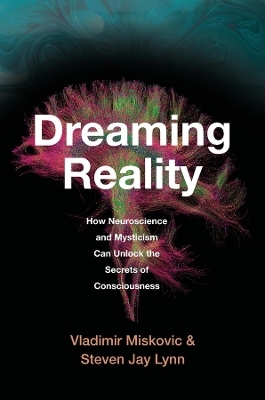
Dreaming Reality
How Neuroscience and Mysticism Can Unlock the Secrets of Consciousness
Seiten
2025
Harvard University Press (Verlag)
978-0-674-27186-9 (ISBN)
Harvard University Press (Verlag)
978-0-674-27186-9 (ISBN)
- Noch nicht erschienen (ca. Februar 2025)
- Versandkostenfrei innerhalb Deutschlands
- Auch auf Rechnung
- Verfügbarkeit in der Filiale vor Ort prüfen
- Artikel merken
Dreaming Reality looks to mystical traditions to challenge orthodoxies of brain science that model consciousness in purely physical terms. Instead of privileging the experience of waking life, the authors study visionary states, ego death, meditation, prayer, and other phenomena that bring us closer to understanding how the mind makes experience.
A cutting-edge neuroscientist and a leading clinical psychologist look to religious, mystical, and mind-altering experience to challenge scientific orthodoxies concerning consciousness.
We are nothing but a pack of neurons, Francis Crick once said. Vladimir Miskovic and Steven Jay Lynn show that this way of thinking is both limited and an obstacle to understanding consciousness. In Dreaming Reality, Miskovic and Lynn connect the latest findings from neuroscience—which studies the brain from the outside in, as a purely physical object—to the insights of the world’s mystical traditions, which chart elaborate cartographies of the mind from inside out through experiences of meditation, prayer, and ecstasy. We can tackle the biggest questions surrounding the nature of consciousness when we place objective scientific research alongside the phenomenology of “altered” states.
Dreaming Reality offers a rich synthesis of brains and minds, new and old, that challenges many cherished notions of how we experience our worlds and selves. Instead of privileging the experience of waking life, Miskovic and Lynn take this only as the starting point of a progressive disentanglement of consciousness. Delving into Buddhism, Vedanta, and Christian mysticism, they find that we have much to learn from dreams, hallucinations, visionary states, ego death, mind wandering, sensory deprivation, psychedelic experimentation, meditation, and minimal phenomenal experiences of consciousness.
Each chapter brings us closer to understanding how we dream reality into existence and how we might transcend impoverished materialist models, whose unacknowledged effect is to drive us toward nihilism. Instead, we arrive at a model of consciousness that is more capacious and compassionate than biological sciences alone can imagine.
A cutting-edge neuroscientist and a leading clinical psychologist look to religious, mystical, and mind-altering experience to challenge scientific orthodoxies concerning consciousness.
We are nothing but a pack of neurons, Francis Crick once said. Vladimir Miskovic and Steven Jay Lynn show that this way of thinking is both limited and an obstacle to understanding consciousness. In Dreaming Reality, Miskovic and Lynn connect the latest findings from neuroscience—which studies the brain from the outside in, as a purely physical object—to the insights of the world’s mystical traditions, which chart elaborate cartographies of the mind from inside out through experiences of meditation, prayer, and ecstasy. We can tackle the biggest questions surrounding the nature of consciousness when we place objective scientific research alongside the phenomenology of “altered” states.
Dreaming Reality offers a rich synthesis of brains and minds, new and old, that challenges many cherished notions of how we experience our worlds and selves. Instead of privileging the experience of waking life, Miskovic and Lynn take this only as the starting point of a progressive disentanglement of consciousness. Delving into Buddhism, Vedanta, and Christian mysticism, they find that we have much to learn from dreams, hallucinations, visionary states, ego death, mind wandering, sensory deprivation, psychedelic experimentation, meditation, and minimal phenomenal experiences of consciousness.
Each chapter brings us closer to understanding how we dream reality into existence and how we might transcend impoverished materialist models, whose unacknowledged effect is to drive us toward nihilism. Instead, we arrive at a model of consciousness that is more capacious and compassionate than biological sciences alone can imagine.
Vladimir Miskovic was formerly Assistant Professor of Psychology and Integrative Neuroscience at Binghamton University (SUNY) and research scientist at X: The Moonshot Factory, previously known as Google X. Since 2023, he has been exploring monastic life in the contemplative community at New Skete Monastery in Cambridge, New York. Steven Jay Lynn was Distinguished Professor of Psychology at Binghamton University (SUNY), where he directed the Laboratory of Consciousness, Cognition, and Psychopathology. He was Founding Editor of the journal Psychology of Consciousness. His nearly two-dozen books have been translated into more than twenty languages.
| Erscheint lt. Verlag | 4.2.2025 |
|---|---|
| Zusatzinfo | 9 illus. |
| Verlagsort | Cambridge, Mass |
| Sprache | englisch |
| Maße | 156 x 235 mm |
| Gewicht | 733 g |
| Themenwelt | Geisteswissenschaften ► Psychologie ► Allgemeine Psychologie |
| Geisteswissenschaften ► Psychologie ► Biopsychologie / Neurowissenschaften | |
| Geisteswissenschaften ► Psychologie ► Verhaltenstherapie | |
| Naturwissenschaften ► Biologie ► Humanbiologie | |
| Naturwissenschaften ► Biologie ► Zoologie | |
| ISBN-10 | 0-674-27186-6 / 0674271866 |
| ISBN-13 | 978-0-674-27186-9 / 9780674271869 |
| Zustand | Neuware |
| Informationen gemäß Produktsicherheitsverordnung (GPSR) | |
| Haben Sie eine Frage zum Produkt? |
Mehr entdecken
aus dem Bereich
aus dem Bereich
Techniken der Verhaltenstherapie
Buch (2024)
Julius Beltz GmbH & Co. KG (Verlag)
35,00 €


